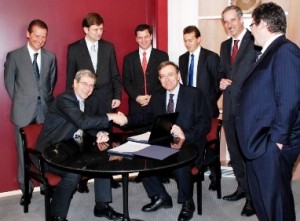The BMW Group and PSA Peugeot Citroën will continue their engine sharing that dates back to the reintroduction of the Mini brand in 2002.
A revised agreement was signed by Norbert Reithofer, Chairman of the Board of Management of BMW AG, and Philippe Varin, Chairman of the Managing Board of PSA Peugeot Citroën, in Paris.
The two companies will develop the next generation 4-cylinder gasoline engine, which will meet stringent EU 6 requirements, which take effect in 2014, and strictly limit CO2, hydrocarbon and nitrogen oxide emissions.
Currently, the engine is being used in several Mini models, the Peugeot 207 and 308, as well as Citroën’s C3 Picasso.
The existing family of 1.6 – liter turbocharged petrol engines, with fully variable valve timing and direct fuel injection have power outputs ranging from 55 kW (75 hp) to 128 kW (175 hp).
The cars they are used in have been favorably reviewed, and there does not appear to be any negative effects on the brands, which could come from the use of a common engine.
There is a widespread assumption in the industry that engine technology is best held closely at individual makers. That assumption is increasingly pushed aside, though, as development costs skyrocket due to emissions and efficiency demands on what is an automobile’s single most expensive component.
Still, preserving brand integrity in a world of shared pieces is a delicate balancing act.
At BMW’s last annual meeting, Dr. Norbert Reithofer, Chairman of the Board of Management, said, “Co-operations will remain an integral part of our strategy, but not at the expense of our independence. A co-operation always needs to result in a win-win situation for both parties. We successfully cooperate with PSA in the field of engine production for our MINI cars. We will extend our co-operation with Daimler on the purchase of parts and components. And for the MINI E we will work closely with various energy providers.”
BMW and PSA also confirm that they are looking at other areas for cooperation, regarding unspecified systems and components, with the aim of decreasing costs in the development and production or purchasing of components.
“This new agreement with BMW is confirming the success of the cooperation between our two companies which has produced 1.3 million engines since 2006,” said PSA Peugeot Citroën’s Chairman of the Managing Board Varin. “I am confident that the next generation of jointly developed engines will reach the same success as the current generation.”

